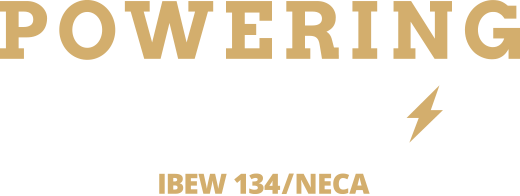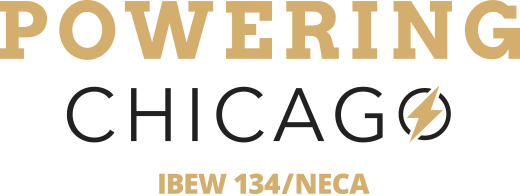30+ Years of Better Construction as One of the Trailblazing Women in the Chicago Electrical Industry
- Posted: March 30, 2020
- better careers, better construction, Canino Electric, Federation of Women Contractors, Golf Mill Shopping Center, Katie Canino, Susan Eisenberg
In 1978, President Jimmy Carter signed a series of executive orders designed to promote equal employment opportunity. While these official actions led increasing numbers of women to begin competing for high-paying, stable jobs as electricians, no politician could address overnight the entrenched culture characterized in a 2010 IBEW publication as an “exclusive macho camaraderie that could not be easily extended, or even explained, to female workers.” Though women began entering the workforce, the challenges they faced were significant. Susan Eisenberg, a member of Boston’s Local 103, described how “for some men, getting rid of the ‘invaders’ was a personal mission.”
This is the context necessary to appreciate just how extraordinary Powering Chicago member Katie Canino’s career has been. Just 10 years after Carter’s Executive Order, Katie entered the electrical industry with no prior experience. After working as a paralegal helping attorneys facilitate mergers and acquisitions, Katie had become a stay-at-home mother. With her husband, Carl, employed at the time in the electrical industry but looking for a new challenge, and the economy picking up again after a recession early in the 1980s, Katie decided after six years out of the workforce that the time was right for them to join forces and launch their own company, Canino Electric.
Officially formed in 1988, Canino Electric began out of Katie and Carl’s home. With their dining room repurposed as a space for blueprints and their garage acting as a warehouse, Katie and Carl secured their first job at the Golf Mill Shopping Center. Through word of mouth, that job led to another, which led to the next one, helping the newly established company get off the ground. Not that the early years were easy.
“Every year for the first six or seven years, I would tell friends and family, you know, come January, this is probably going to be it,” Katie recalled. “I’m pretty sure we’re closing the doors because I don’t have any work and it’s not looking good.”
Though Katie’s background in business was solid, there was a natural learning curve managing a company in an industry in which she hadn’t previously worked. She says, “I found out that construction is its own animal. When we started out, it was basically kind of a handshake and we’ll do that job for you, no problem. There were hardly ever written contracts. I had insurance, but no one ever asked for it. The learning curve was in how to manage cash flow, maintain stable manpower, bring in new business, how to plan for everything. It was learning all of those things. And then having to adapt along the way.”
Compounding the challenge was Katie’s status as a female owner in an industry still dominated by men. Though the industry had progressed since the influx of female electricians in the late 1970s, it was still far from a welcoming environment.
“Everywhere I went, every networking session I went to, I was usually the only woman in the room,” Katie recalled. “And every now and then, you’d run into somebody else and think, ‘thank God there’s somebody else out there.’ It was uncomfortable. Even on job sites, because people rolled their eyes and you could tell they were wondering ‘what’s she doing here?’”
Despite the barriers Katie faced, Canino Electric grew consistently, developing a reputation for the quality of its work, which led to larger and more complex projects. As the company grew, Katie managed as a hands-on owner willing to take on whatever task needed to be accomplished to see the company through to the next day. Along the way, she was inspired to keep pushing by the other women she met in the industry, saying, “without women that helped me, I don’t think I would be here today.”
Among those who provided support were fellow members of the Federation of Women Contractors, founded in 1989 to foster the advancement of entrepreneurial women in metro Chicago’s construction industry. Katie became active in the organization, ultimately serving a term as its president. All the while, Canino Electric thrived, building a roster of notable clients that includes the University of Chicago, Rush Hospital, and several of the city’s prominent investment management firms, among many others. From standard electrical maintenance to highly complex work on data centers that must occur outside of standard working hours to avoid disrupting employees, Canino Electric has proved time and again its ability to exceed expectations and deliver better construction, whatever the project. Consistently doing so has paid dividends, helping Canino grow from a home-based business staffed only by the owners to a vibrant company that employs 40-50 electricians at any given time.
According to Katie, the credit for the company’s success belongs largely to its dedicated employees, saying, “Our electricians and administrative office staff are the backbones of the company. I rely on them to handle the day-to-day issues that we face as a business, and they never let me down. They are more like family than employees, and without each and every one of them, there would be no Canino Electric.”
Reflecting on what it took to get to this point, Katie points out that there is still room for improvement for the industry and its efforts to increase gender diversity, but that the progress made during her career has been noticeable.
“It was difficult for many years, and I would say in some ways it still is difficult. There are people out there who think that women cannot do this job. And even though I think we’ve proved it over and over again, the stigma is still out there. Despite that, there has been a clear shift over time. The younger people coming into the industry have been raised in a different environment. There is definitely more opportunity now for women in the industry.”
With more than 30 years of experience building a successful business as one of the few female owners in the area, Katie is always willing to pass on some of the lessons she’s learned to women embarking on their own careers in the industry. She cites a willingness to work, above all else, as the key to success, while also noting the importance of making your voice heard.
“Don’t be intimidated. Always put your hand out there, introduce yourself, look them in the eye and know if you are willing to work hard and do a good job, there’s no reason for them not to give you a chance and let you prove yourself. Because if you put everything you can into it and you deliver the work, they’re going to come back and they’re going to ask you again.”
As Women’s History Month comes to a close, it is stories like Katie’s that demonstrate just how far the industry has come in one generation, while underscoring the need to continue striving to make it possible for more women like Katie to contribute their talents to the unionized electrical industry to create better construction, better careers and better communities for all.

